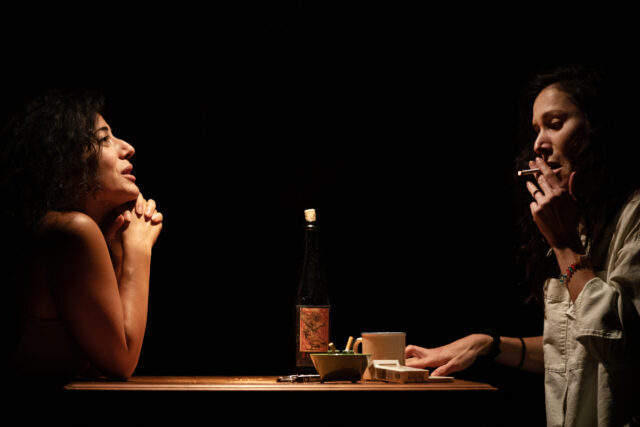
Novella (Nadine Malouf) and Faith (Ariana Venturi) face an uncertain future in Montag (photo by Julieta Cervantes)
MONTAG
Soho Rep
46 Walker St. between Broadway & Church St.
Tuesday – Sunday through November 20, $55
sohorep.org
In German, Montag, the name of Kate Tarker’s new play, making its world premiere at Soho Rep through November 20, means “Monday,” a day that is critical to the plot of the eighty-minute show. But it also made me think of Guy Montag, the protagonist of Ray Bradbury’s sci-fi classic Fahrenheit 451. Named after a paper company, Montag is a firefighter in charge of finding books in people’s homes and burning them, at 451 degrees Fahrenheit.
In the first chapter, Bradbury writes, “The last few nights he had had the most uncertain feelings about the sidewalk just around the corner here, moving in the starlight toward his house. He had felt that a moment before his making the turn, someone had been there. The air seemed charged with a special calm as if someone had waited there, quietly, and only a moment before he came, simply turned to a shadow and let him through. Perhaps his nose detected a faint perfume, perhaps the skin on the backs of his hands, on his face, felt the temperature rise at this one spot where a person’s standing might raise the immediate atmosphere ten degrees for an instant. There was no understanding it. Each time he made the turn, he saw only the white, unused, buckling sidewalk, with perhaps, on one night, something vanishing swiftly across a lawn before he could focus his eyes or speak. But now tonight, he slowed almost to a stop. His inner mind, reaching out to turn the corner for him, had heard the faintest whisper. Breathing? Or was the atmosphere compressed merely by someone standing very quietly there, waiting? He turned the corner.”
That same feeling pervades Montag, which takes place in set designer Lisa Laratta’s dark box in the middle of the stage. A lone light dangles from the ceiling. (The appropriately dingy lighting is by Masha Tsimring.) Faith (Ariana Venturi) and Novella (Nadine Malouf) sit opposite each other at a small table, the former smoking a cigarette, the latter crunching loudly on chips and crinkling the plastic snack bag. It’s live, in-person ASMR for the audience, experienced in a mysterious claustrophobic space instead of an online video. In the back is a wall filled with random, mostly unidentifiable objects, like remnants from a life shuttered away. Next to that is a doorway through which light can be seen, reminiscent of that corner Montag eventually turns onto.
It’s April 2014, and Faith and Novella live together in a basement apartment on a US army base in Germany; the former is a lead systems analyst from America, while the latter is a comfort woman for the soldiers, a Turkish immigrant who is now a German citizen. They are contemporary versions of the Gastarbeiter, or guest workers, who moved to Germany between 1955 and 1973; each one is married and has a child, none of whom the audience ever sees.

Two friends (Ariana Venturi and Nadine Malouf) search for meaning in Soho Rep world premiere (photo by Julieta Cervantes)
On this evening, Novella is ready to party. “We go all night?” Novella asks. “That’s the deal,” Faith says. “The deal we made with the devil.” They are in day seven of some kind of weeklong deprivation. During that time, a colleague of Faith’s named Clifford Andrews has gone missing. Faith interviews Clifford, channeled by Novella, who, when asked why he stopped coming to work, replies, in a nod to the Boomtown Rats, “Maybe I just don’t like Mondays.” He eventually gets extremely angry, which adds to the sense of danger that surrounds the somewhat existential situation. “Are you planning anything, Cliff?” Faith asks. (The Boomtown Rats’ 1979 hit “I Don’t Like Mondays” was based on a school shooting that year in San Diego.)
But even as they worry about what might happen next, they occasionally break out into song and dance, putting on glittering costumes (by Montana Levi Blanco) and moving and grooving to Beyoncé as well as Rupert Holmes’s “Piña Colada Song,” the real name of which is actually “Escape.” Several characters who enter late, played by Dane Suarez and Jacob Orr, add further confusion to an abstruse plot that is never fully revealed while also providing a sense of finality.
Director Dustin Wills (Wolf Play, Plano) has trouble finding a narrative flow to the proceedings, which too often feel jumpy and random, although he does capture the overall sense of impending doom. Venturi (Mary Page Marlowe, These Paper Bullets!) and Malouf (A Bright Room Called Day, Intractable Woman: A Theatrical Memo on Anna Politkovskaya) form an engaging bond as the friends trapped in a dystopian near-future.
Tarker (Thunderbodies, Laura and the Sea), who grew up on the outskirts of an army base in Germany, has cited such wide-ranging influences on the play as Carrie Mae Weems’s “Kitchen Table Series,” Rainer Werner Fassbinder’s Ali: Fear Eats the Soul, Martha Rosler’s Semiotics of the Kitchen, and Ridley Scott and Callie Khouri’s Thelma & Louise, which accounts for the show’s unpredictable course and what it is inherently about, although it’s no coincidence that in August 2014, four months after Montag is set, authoritarian Recep Erdoğan will be elected president of Turkey.
Faith sums it all up when she says, “Most people — they have no idea. How scary the world is.”
Ray Bradbury’s Montag would no doubt agree.